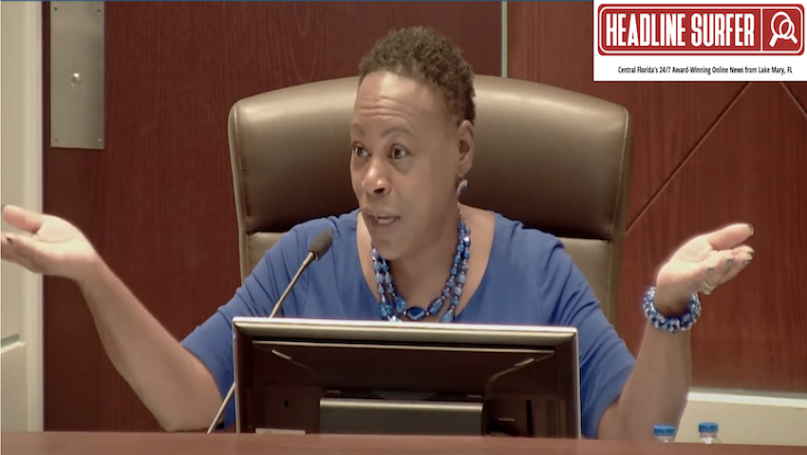
Headline Surfer photo / Volusia County Councilwoman Barara Girtman is all supportive on the dais of the Frank J. Bruno, Jr. County Council Chambers in DeLand, Florida on Tuesday, July 29, 2022.
By HENRY FREDERICK / Headline Surfer
DELAND, Fla. -- Volusia County has always been synonymous with a need for speed.
The Volusia County Council approved a new kind of speed on Tuesday for some residents in the form of broadband infrastructure.
Residents and businesses in selected areas of the county will soon have access to high-speed internet thanks to funds from the federal government.
The council unanimously approved a sub-recipient agreement with Spectrum of $4.57 million to construct a $17.62 million broadband infrastructure network to bring internet services that meet or exceed a speed of 100 Mbps download and 100 Mbps upload to certain areas of the county. The areas receiving the new infrastructure have gone unserved or underserved before now.
The addition will impact more than 3,700 dwellings and is expected to bring internet to some of these areas as early as January 2024.
“I definitely look forward to working with Spectrum in a number of our underserved areas and in bringing new resources to them,” District 1 Councilwoman and Vice Chair. Barbara Girtman said.
“I definitely look forward to working with Spectrum in a number of our underserved areas and in bringing new resources to them,” District 1 Councilwoman and Vice Chair. Barbara Girtman said.
The agreement with Spectrum also requires the provider to offer similar pricing and service tiers to new customers as it offers to existing customers in the local area.
While most of the new service area will be in northwest Volusia, the full list of areas gaining more access is Astor, Daytona Beach, DeLand, DeLeon Springs, Deltona, Edgewater, New Smyrna Beach, Oak Hill, Osteen, Pierson, Port Orange, and Seville.
Funds for the project will come from the American Rescue Plan Act, or ARPA, designated to offer relief from the impacts of COVID-19.
During the pandemic, areas with unreliable internet faced many issues from not being able to work from home, conduct business, participate in distance learning or virtual meetings, and lacked quick access to pertinent information offered only online. For many, access to the internet is essential to help bridge the digital divide in rural areas.
 About the Byline Writer: Henry Frederick is a member of the working press and publisher of Headline Surfer, the award-winning 24/7 internet news outlet launched in 2008, that serves greater Daytona Beach, Sanford & Orlando from Lake Mary, Florida via HeadlineSurfer.com. Frederick has amassed close to 150 award-winning bylines in print & online. He earned his Master of Arts in New Media Journalism from Full Sail University in 2019. He was a breaking news reporter (metro cops & courts beat) for the Daytona Beach News-Journal for nearly a decade. And Before that worked the same beat for The Journal-News/Gannett Suburban Newspapers in Rockland/Westchester counties, NY, dating back to 1989. Having witnessed the execution of serial killer Aileen Wuornos in Florida's death chamber and covering other high-profile cases such as the George Zimmerman murder trial, Frederick has appeared on national crime documentary shows on Discovery ID, Reelz, and the Oxygen Network series "Snapped" for his analysis. AWJ:
About the Byline Writer: Henry Frederick is a member of the working press and publisher of Headline Surfer, the award-winning 24/7 internet news outlet launched in 2008, that serves greater Daytona Beach, Sanford & Orlando from Lake Mary, Florida via HeadlineSurfer.com. Frederick has amassed close to 150 award-winning bylines in print & online. He earned his Master of Arts in New Media Journalism from Full Sail University in 2019. He was a breaking news reporter (metro cops & courts beat) for the Daytona Beach News-Journal for nearly a decade. And Before that worked the same beat for The Journal-News/Gannett Suburban Newspapers in Rockland/Westchester counties, NY, dating back to 1989. Having witnessed the execution of serial killer Aileen Wuornos in Florida's death chamber and covering other high-profile cases such as the George Zimmerman murder trial, Frederick has appeared on national crime documentary shows on Discovery ID, Reelz, and the Oxygen Network series "Snapped" for his analysis. AWJ: